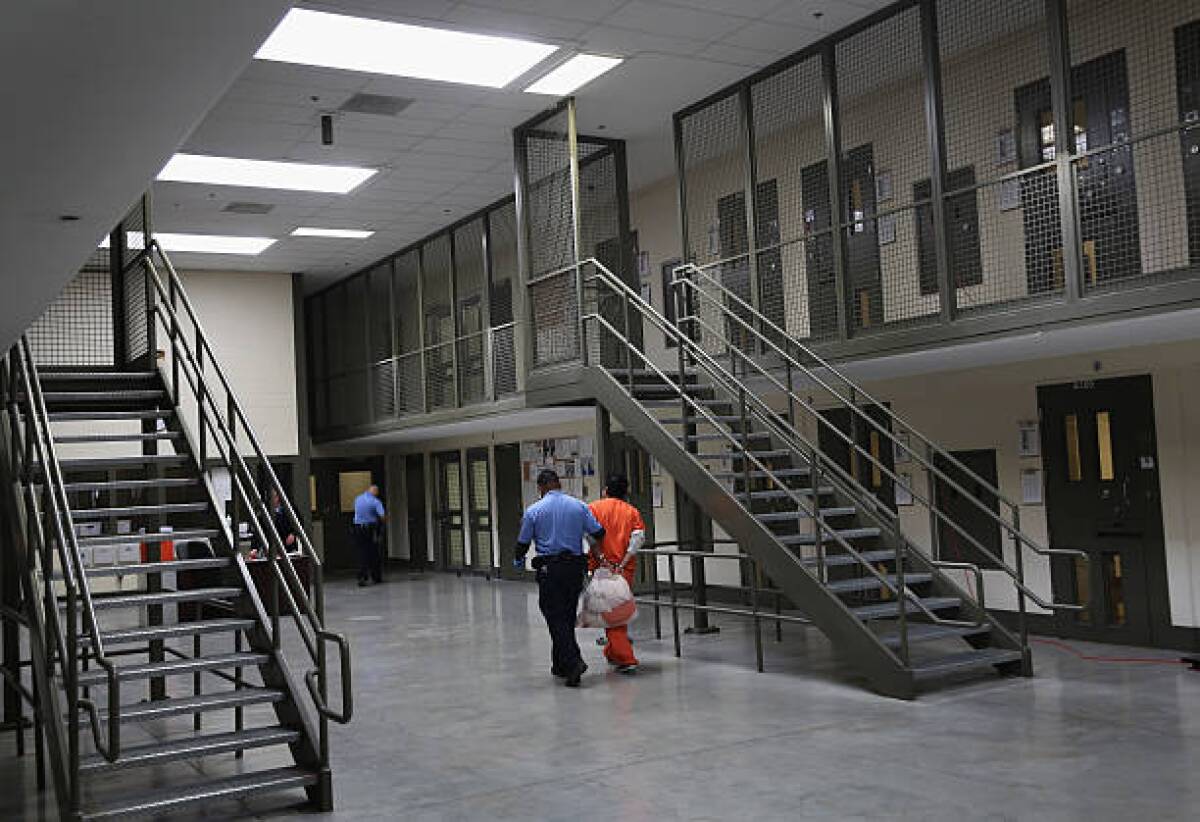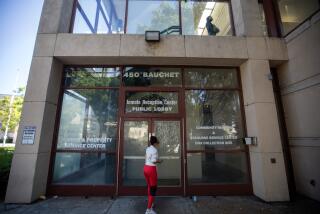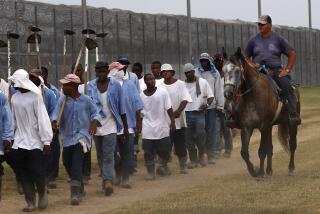Immigrants detained at Adelanto staged a peaceful protest. Guards in riot gear pepper-sprayed them

Mohammed Abdelsalam remembers the scene as a war zone.
The 32-year-old asylum seeker from Egypt said that he and other detainees were peacefully protesting ongoing lockdowns at the Adelanto ICE Processing Facility near Victorville earlier this month when more than a dozen guards in riot gear shot pepper bullets and pepper spray at them.
The chemical irritant instantly caused his eyes to blur and his throat to close up. Abdelsalam, who has asthma, said he had to be taken to the facility’s medical center and given oxygen.
“I lost my breath and almost passed away,” he said. “My heart almost stopped.”
Alexx Pons, a spokesman for Immigration and Customs Enforcement, said that the incident occurred when more than 150 detainees became disruptive and refused directives from staff, necessitating “the use of non-lethal force to preserve order” after attempts at deescalation were unsuccessful.
Detainees paint a different picture of what happened.
Abdelsalam and others said the facility had been under lockdown since June 7, when protesters damaged several vehicles in the parking lot and broke a few of the building’s windows, causing minor injury to an employee inside, according to the Victorville Daily Press.
Detainees said they were kept in their dorm rooms for 23.5 hours a day. Five days later, when an official announced that they needed to return to their rooms because of another planned protest by demonstrators outside the facility, detainees refused. Some stood just outside their rooms, while others sat in the common area.
It was late afternoon when guards told them to “rack up” to be counted. Detainees said they agreed to participate in the count but told guards that they “respectfully refused” to return to their rooms. They said the guards, dressed in black with face shields and gas masks, told them once more to “rack it up” before shooting them indiscriminately with pepper balls, pepper spray and rubber bullets.
Edgar Guillen said he was standing outside his second-floor room for count when a guard standing on the lower level shot a pepper ball at him. The ball hit the wall behind him and exploded onto his face.
“I got really scared because I didn’t know to what extent they were going to take it if we didn’t go inside,” said Guillen, a 25-year-old asylum seeker from Mexico. Afterward, he said it was impossible to sleep and breathe. He coughed and vomited through the night.
Guillen said guards refused to let him out to get cleaning supplies. So the next day, he used his bath towel and toilet water to clean his room.
“I threw it on the floor, got some shampoo that I had and started scrubbing the floor and the walls,” he said.
Detainees yelled that they couldn’t breathe. They said the chemicals caused them to vomit and burned their eyes and skin for hours. One man had a seizure. Another fell down the stairs while being taken to shower and was carried out in a stretcher.
One detainee said he watched guards pelt a man with rubber bullets as he told them he had leukemia.
Pons, the ICE spokesman, said four detainees were transferred to a nearby medical facility and later returned to Adelanto after treatment. Medical staff at the facility assisted other detainees with decontamination, he said.
“Detainees ultimately complied and returned to their rooms, and facility staff were able to restore order and prevent further risk of injury to both detainees and staff,” he said.
Abdelsalam said he was placed in segregation and wasn’t allowed out of the room to call his lawyer or shower for three days, which prolonged the effects of the pepper spray. More than a week after the incident, he still had trouble breathing and was taking 15 puffs a day of his inhaler, which has a recommended dosage of three puffs a day.
Guillen said it wasn’t fair for detainees to be punished for protests taking place outside the facility.
“We decided that if they’re going to protest on our behalf, we should stand up for ourselves as well,” he said. Guillen anticipated the possibility that detainees could be handcuffed and forced into their rooms but not the level of force they encountered.
The incident was preceded by weeks of detainee complaints that Adelanto facility employees are using a hazardous disinfectant spray about every 20 minutes in poorly ventilated areas, causing nose bleeds, burning eyes, nausea and headaches.
In a legal complaint filed May 21, the advocacy groups Freedom for Immigrants and the Inland Coalition for Immigrant Justice allege that staff are purposefully exposing detainees to the spray, called HDQ Neutral, as a form of retaliation for speaking out about dangerous conditions amid the coronavirus outbreak.
Reps. Mark Takano and Juan Vargas sent a letter to acting ICE Director Matthew Albence, calling the reports troubling and pointing to the HDQ Neutral manufacturer warning about the chemical’s use indoors.
ICE maintains that it is following EPA and CDC guidance in using the disinfectant to mitigate the spread of COVID-19 at the facility.
Earlier this year, eight former ICE detainees settled a civil rights lawsuit against the Geo Group, the private prison company that runs Adelanto, after guards pepper-sprayed them while they protested facility conditions by sitting in the common area outside their rooms.
Last week, the same lawyers who litigated that case sent a new letter to Adelanto Warden James Janecka and other facility officials demanding that they preserve evidence, including videos, of the pepper spray incident, chemical disinfectant use and any other instances of force or punishment in anticipation of a lawsuit.
“All of this conduct is blatantly unconstitutional,” the lawyers Rachel Steinback and Catherine Sweetser wrote.
Under a class-action lawsuit brought by the American Civil Liberties Union, a federal judge ruled June 19 that ICE provide information on Adelanto detainees for potential release on bail in order to depopulate the facility to a level that allows social distancing. The facility currently holds nearly 1,000 detainees. Ten detainees there have tested positive for the coronavirus as of Wednesday, according to ICE.
ACLU attorney Minju Cho said she hopes the bail application process will be speedy.
“I never could have imagined it but conditions in Adelanto today are more hellish than they were on the day we filed our lawsuit,” she said. “ICE and GEO have shown that they cannot be trusted with the health and safety of our clients. Release is the only way to keep them safe.”
Times staff writer Brittny Mejia contributed to this report.
More to Read
Sign up for Essential California
The most important California stories and recommendations in your inbox every morning.
You may occasionally receive promotional content from the Los Angeles Times.











